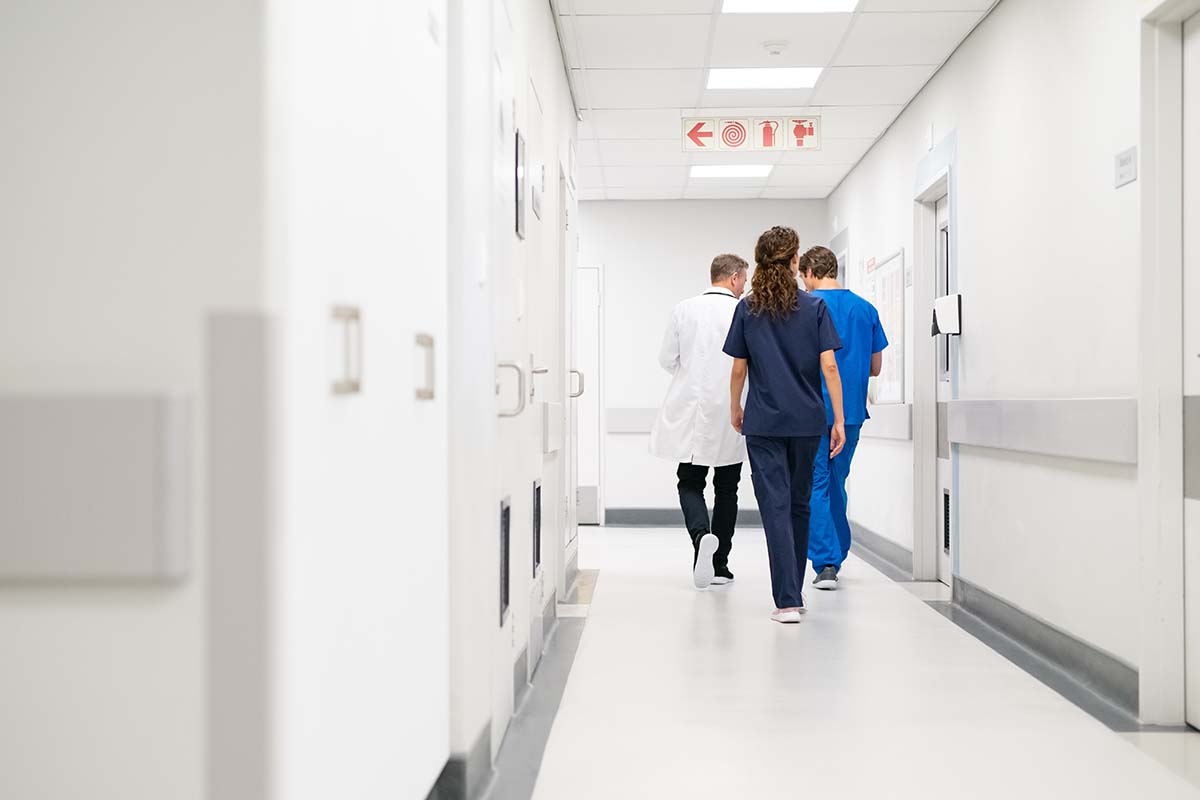Surgery Setting & Procedures at a Hospital vs. at an Ambulatory Surgical Center
The primary difference between a hospital and an ambulatory surgery center (ASC) lies in the setting and the types of procedures that are performed at each location. Let’s break down the key aspects in detail:
Hospital Surgery
- Setting: Hospitals are comprehensive healthcare facilities equipped to handle a wide range of medical services, including surgeries. They provide various departments such as emergency care, intensive care, radiology, and more.
- Types of Surgeries: Hospitals are capable of performing both major and minor surgical procedures. They cater to a wide variety of medical needs, including complex surgeries that require advanced medical resources and a larger support staff.
- Resources: Hospitals have access to a wide range of medical equipment, advanced technology, and a variety of medical specialists. This makes them suitable for surgeries requiring specialized expertise or the need for multiple medical disciplines.
- Patient Conditions: Hospitals are equipped to handle patients with a wide range of medical conditions, including those with complex medical histories or those who might require a higher level of post-operative care due to underlying health issues.
- Post-Operative Care: Hospitals generally have more extensive post-operative care facilities, including intensive care units (ICUs) and specialized nursing staff, which is particularly important for patients who undergo major surgeries or who may face complications.
Ambulatory Surgery Center (ASC)
- Setting: Ambulatory Surgery Centers (ASCs), also known as outpatient surgery centers or day surgery centers, are healthcare facilities designed specifically for performing same-day surgical procedures. They are not attached to a hospital and are usually more streamlined in terms of services.
- Types of Surgeries: ASCs focus on performing relatively simple and minor surgical procedures that do not require an overnight hospital stay. These can include procedures like cataract removal, endoscopies, minor orthopedic surgeries, and various types of elective surgeries.
- Resources: ASCs are equipped with the necessary resources for performing outpatient surgeries efficiently. However, they might not have the same level of advanced equipment and specialized medical staff as hospitals.
- Patient Conditions: ASCs typically cater to patients who are in relatively good health and have fewer underlying medical conditions. This ensures that the risk of complications is minimized, and patients can recover at home.
- Post-Operative Care: Since ASCs are focused on same-day procedures, their post-operative care is generally limited to the immediate recovery period before patients are discharged to go home. Patients are expected to have a responsible adult to drive them home and provide support during the initial recovery period.

Surgery Costs at a Hospital vs an Ambulatory Surgical Center
Additionally, there can be cost differences between getting a surgery at a hospital and at an ambulatory surgery center (ASC). It’s important to note that these costs can vary significantly based on factors such as the type of surgery, location, insurance coverage, and specific healthcare providers. However, I can provide you with some general insights into the cost differences:
Hospital Surgery Costs
- Post-Operative Care: Hospitals can accommodate patients who need longer post-operative care or who might face complications. This extended care can lead to increased costs.
- Facility Fees: Hospitals often have higher overhead costs due to their comprehensive facilities, including 24/7 staff, advanced technology, and extensive post-operative care options. This can result in higher facility fees compared to ASCs.
- Specialized Staff: Hospitals have a larger team of specialized medical professionals, including surgeons, anesthesiologists, nurses, and support staff. These professionals might charge higher fees for their services, contributing to the overall cost.
- Insurance Impact: The cost of a hospital surgery can be influenced by your insurance coverage, deductibles, and copayments. Depending on your insurance plan, you might have higher out-of-pocket expenses for hospital-based procedures.
Ambulatory Surgery Center (ASC) Costs
- Facility Fees: ASCs generally have lower operating costs compared to hospitals because they focus on outpatient procedures and don’t provide the same level of comprehensive care. This can result in lower facility fees.
- Simplified Staffing: ASCs typically have a smaller staff and may not require as many specialized professionals as hospitals. This can lead to cost savings in terms of staff fees.
- Shorter Recovery Period: Since ASCs focus on same-day procedures, patients are usually discharged after a shorter recovery period. This can lead to cost savings as compared to a longer hospital stay.
- Insurance Impact: Depending on your insurance plan, you might have lower out-of-pocket expenses for procedures performed at ASCs. Some insurance plans offer better coverage for outpatient procedures.

Surgery Patient Experience at a Hospital vs an Ambulatory Surgery Center
Lastly, the patient experience can differ between getting a surgery at a hospital and at an ambulatory surgery center (ASC). Here’s an overview of what you might expect in terms of the patient experience at each type of facility:
Hospital Surgery Patient Experience:
- Pre-Operative Process: If you’re having surgery at a hospital, you might undergo a more extensive pre-operative process. This could involve additional medical tests, consultations with various specialists, and paperwork.
- Admission: Hospital surgeries often require patients to be admitted the day before or the day of the surgery. This might involve waiting in a pre-surgery area and getting settled in a hospital room if an overnight stay is necessary.
- Waiting Times: Due to the complexity of hospital services and the range of patients they serve, waiting times can be longer. This includes waiting for various pre-surgery procedures, consultation with different medical professionals, and potentially for the surgery itself.
- Post-Operative Care: Hospitals offer more extensive post-operative care options, including recovery rooms, intensive care units (ICUs), and specialized nursing staff. This is especially important for patients undergoing major surgeries or those with potential complications.
- Hospital Stay: Depending on the surgery and the expected recovery time, you might need to stay in the hospital for a longer period. This could involve being monitored by medical professionals and receiving ongoing care.
Ambulatory Surgery Center (ASC) Patient Experience:
- Pre-Operative Process: The pre-operative process at an ASC is often more streamlined. You’ll typically undergo necessary tests and consultations, but the process is generally focused on the specific surgery you’re having.
- Admission: At ASCs, you’ll likely arrive on the day of the surgery and go through a shorter admission process. You’ll be prepared for the surgery and taken to the operating room.
- Waiting Times: ASCs are designed to minimize waiting times. Since they perform same-day surgeries and focus on specific procedures, the process is usually more efficient.
- Post-Operative Care: The post-operative care at ASCs is generally shorter and more focused on immediate recovery. You’ll be monitored for a brief period as you wake up from anesthesia, and once you’re stable, you’ll be discharged to go home.
- Recovery: After a procedure at an ASC, you’ll be required to have someone accompany you home, as the effects of anesthesia can last for a few hours. Your recovery will continue at home, and you’ll receive instructions for follow-up care and any necessary medications.

Specialty surgery centers are a specific type of ASC. St. Raphael Surgery Center is a specialty surgery center, specializing in advanced general, vascular, and podiatric surgery. Our center is designed with advanced equipment and expert staff that focus in these areas.
Ambulatory surgery centers (ASC) are designed to provide more cost-effective options for procedures that can be safely performed on an outpatient basis. However, it’s important to consult with your healthcare provider and your insurance company to get a clear understanding of the potential costs associated with your specific surgery. They can help you make an informed decision about which facility is the best choice for your medical needs, taking both medical considerations and financial factors into account.
Finally, the patient experience at a hospital might involve a more comprehensive and extended process, including admission, longer waiting times, and a potentially longer stay for recovery. In contrast, an ambulatory surgery center offers a more streamlined experience, with shorter admission and waiting times, and a focus on same-day procedures, more personalized nursing care and quicker recovery times.






